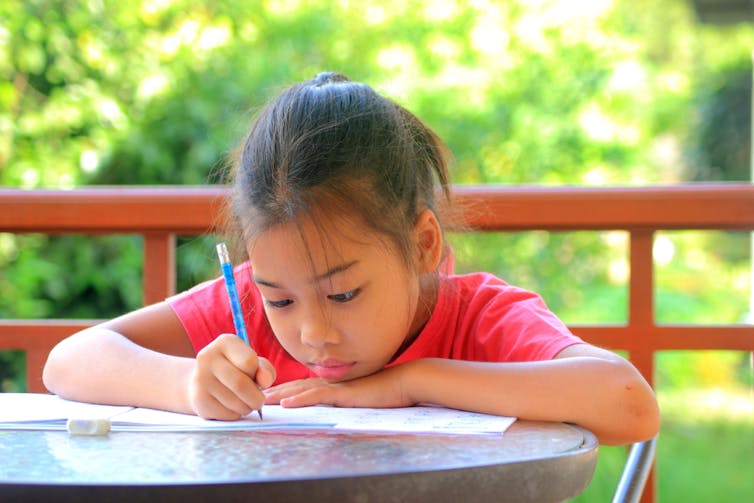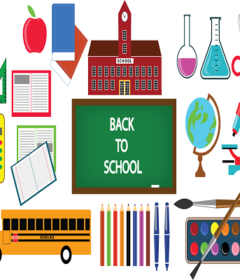How to talk to your child about their school report

Remember to look for the positives in your child’s report. Shutterstock
Katina Zammit, Western Sydney University
It’s that time of year again when you receive your child’s school report. For some parents and carers, understanding what it means can be challenging. Some children will be happy and others may be disappointed.
Parents and carers need to interpret the information in the report so you can determine the strengths of your child, work out how their learning is progressing and what areas they’re having difficulty in. This may involve having a discussion with your child or a follow-up meeting with your child’s teacher.
Read more:
Some school reports valuable for parents, others just a mystery
It’s important to remember to be supportive, consider the personality of your child and focus on their progress.
Achievement standards: A-E grades
Primary and secondary schools (not including the senior years) in most Australian states use A-E grades to describe the learning progress of children.

www.shutterstock.com
So what do the letters A to E on your child’s report card actually represent?
The A-E grades may also be used to report on a child’s effort in a curriculum area. So a child may have a high grade for effort but a lower grade for achievement. If effort is basic (D) or low (E), this may be of concern.
Talking about the report
It’s important to ask your child: what do you think of the grade (for the subject)? Talking about this helps you open up a conversation about whether the report is close to what your child thinks they’ve achieved. If your child thinks they are not doing very well, focus on their achievements in one subject as well as pointing out their achievements outside of school. Focus on their progress.
If you are not familiar with what your child has been learning, find out what they have been doing in each subject. You can ask: what tasks have you been doing in class? Have you been finishing the tasks? What did you find easy? What was hard for you?
If their grade is based on a single test, it provides little information on what your child’s strengths are or their difficulties. With a range of tasks (completed in class and at home), the grade may be a better representation of your child’s achievement. So ask them: do you know how you got this grade? What assessments have you done in class? If they or you can’t answer these questions, you may both be unhappy because you don’t understand how the grades were calculated.

www.shutterstock.com
This might be the time to talk about the grades for effort in the subject, which can tell you how much your child is trying. Ask: I notice you have been putting a lot of effort into (subject). That’s good. You’re trying hard. Or, what is happening in (subject) that’s affecting your effort? What can you do to improve?
This enables you to have insight into what’s going well and in which subject, which may reflect their interests, dislikes and challenges.
It also opens up discussion of what they’re finding difficult and why. Find out if they weren’t interested or the work was too hard for them. Different children have different interests, skills and passions which may not be reflected in their report card. Children also have different personalities that influence their learning, their progress and their report. We’re not all academically inclined.
If your child is disappointed point out the positives. Say: you tried really hard in (subject). I know you are having some difficulties, but look at what you have learnt this year.
A child’s answers can be an opportunity for discussing their progress with the teacher and what adjustments can be made to ensure continued progresses. This may be at the school organised teacher-parent interview, or you can ask for an interview with the teacher. You can then talk to your child about these adjustments and frame them along the lines of: your teacher thinks you’ll start to enjoy reading more if you and I do some more reading at home.
The comments section
Comments also highlight the strengths and weaknesses of your child as a learner.
Read more:
Testing times: making the case for new school assessment
What does the comment say about the child? Does the comment hint at an area of concern, either academically, socially or behaviourally? Does the comment reflect what you know about your child? If it doesn’t, you need to make time to speak with their teacher. Again, use the opportunity to ask your child, after reading the comments aloud: what do you think of this comment? Why has the teacher made this comment?
Throughout the conversation with your child about their report, remember to look for the positives: your child’s strengths, the progress they’re making. Talk about what might help them in areas they’re doing well in, as well as those they are finding challenging. Explain the report to them and help them understand what it means.![]()
Katina Zammit, Deputy Dean, School of Education, Western Sydney University
This article is republished from The Conversation under a Creative Commons license. Read the original article.

